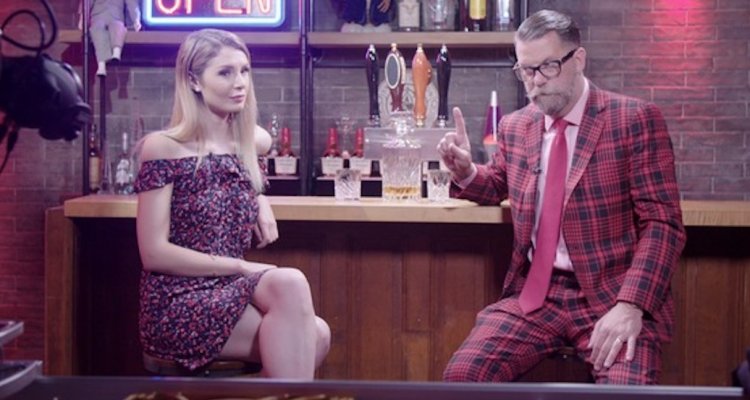A queasily riveting documentary that puts the audience far closer than comfort to some of the worst people in the world, ‘White Noise’ builds a template for how in the modern media landscape, the need to confront and make noise can overlap with greed and narcissism to create deadly results. Rather than present a sweeping portrait of the alt-right, he shrewdly picks three of its showier spokespeople—Richard Spencer, Lauren Southern, and Mike Cernovic—and follows what happens as infamy, infighting, and the consequences of their hate speech takes its toll on both its progenitors and the world they inflict themselves on.
READ MORE: The Best Documentaries Of The Decade [2010s]
For his feature debut, Daniel Lombroso takes an immersive approach. He dives in without preamble, following his subjects from one event to the next, catching them in often unguarded moments. Without the cooling counterpoint of media or academic talking heads providing context and commentary, Lombroso delivers close, often uncomfortable intimacy. He catches his subjects in the heat of the alt-right’s coming-out period in 2016 and 2017, when the mainstream press was just starting to turn over some rocks and write about what oozed out.
Fittingly, one of the movie’s earliest scenes is Spencer’s November 2016 conference in Washington, D.C., where his crowing joy over the election—all three subjects seem to take it for granted that Trump is on their side of history, disagreeing with him on this or that policy but generally warmed by the tenor of his racist rhetoric about “seeing your identity demeaned” and creating a white “ethnostate”—is capped by a round of “Hail, Trump” shouts and Nazi-ish saluting. (The conference first made news at the time after Lombroso reported on it with video for The Atlantic, which produced this documentary.) As with everything the alt-right does, that moment and much of what Spencer does and says afterward feels both performative and chilling, like giggly neo-Nazi cosplay that wants post-facto just-a-joke deniability.
Contracted to Spencer’s puffed-up insecurity and pretensions of importance, Cernovic, the movement’s unlikely Howard Stern, appears more fully formed and so more dangerous. A one-time men’s rights advocate and pick-up-guide charlatan, he pivoted with ease to hosing down the Internet with poisonous conspiracy theories whose slurry of anti-Hillary venom and enraged but ill-defined ethnic nationalism was perfectly timed for the Obama backlash and 2016’s car crash election. One of Lombroso’s shorter, sharper segments shows how Cernovic’s rantings passed easily from his fingers to the sets of Fox News and out of the mouth of Trump. At the same time, Cernovic makes fairly clear to Lombroso while lounging around with his Iranian and self-identified “secular Muslim” wife that he is really just in it for the money. Talking about the profiles done on him by 60 Minutes and the New Yorker, he is annoyed about not getting paid for them. Although castigating “Nazis” as “holding us back,” Cernovic cannot articulate a Nazi-free message that he wants to get out there (selling dubious supplements in between Alex Jones-ian paranoid rants and race-baiting is more his game) and seems more annoyed that the optics of Spencer’s goose-stepping torch-bearing goons could mess with the take.
While all three share the social media entrepreneur’s unctuous self-regard, Southern seems the most skilled in the post-David Duke era’s dark art of delivering white nationalist rhetoric in a guise of respectability. A preternaturally confident, preeningly serene Canadian xenophobe in her early twenties who seems caught in a perpetual reality-TV loop, Southern spends much of the movie crafting a schizophrenic profile that feels doomed to failure. Presenting herself as a fearless blonde crusader for the white race (pulling breathless stunts for her online fans like trying to block ships with refugees in the Mediterranean or interviewing migrants in Paris for a propagandistic hit piece), she is also vocal about finding a husband, having babies, and retiring from the “political YouTuber life” like she believes any right-thinking woman must do. Lombroso matches her statements with others in the movement who panic about declining white birth rates. “We need more Western babies,” Proud Boys buffoon Gavin McInnes pontificates at Southern. A following segment that appears to show Southern deftly fending off the married McInnes’s overt propositioning clarifies the trap that the movement’s sexism presents for its relatively few female stars. Like a latter-day Phyllis Schlafly, Southern comes across as wanting it both ways: Putting herself out there as a fearless woman warrior while advocating for the same retrograde gender roles that would imprison her in the kitchen.
None of the movie’s subjects appear willing or able to deal with the consequences of the maelstrom they helped whip up, from the murder of anti-Nazi activist Heather Heyer after the Unite the Right rally to the attacks on synagogues and mosques. Harassed by lawsuits and protesters, Spencer covers himself in self-pity and proclamations (“we’re not going away”). Southern exhibits some moments of doubt but only regarding her future, showing no qualms about acting as a junior varsity Leni Riefenstahl for the “Build The Wall” crowd. Cernovic just bashes aside any hint of culpability with a monumental lack of insight: “I’m a good guy. I’ve said a few dodgy things over the years. Fuck you.”
When Spencer ruminates from his refuge (a baronial family home in Montana that could be a set for ‘Yellowstone’) about how he really wanted to be a theater director, it is hard not to imagine an alternate universe akin to that one where a certain mustached Austrian had the talent and temperament to become a successful painter. In this marginally quieter and happier world, Cernovic stuck to pitching pick-up guides to frustrated dudes, Southern was just another Instagram influencer, Spencer directed plays, and Unite the Right never happened. [A]

